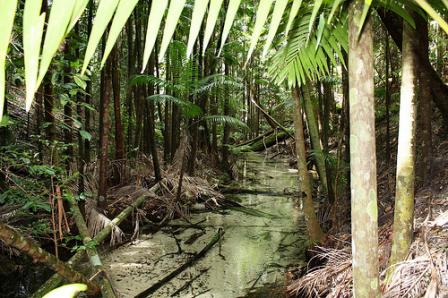When we value life, something fundamentally shifts in us; we look to the inner. It opens the door to self-re?ection and when we do that, we look at the consequences. It is the same with law. Law that is premised on imposed values, such as pro?t and ownership leads to short-term gains without examination of the longer-term implications. Currently, our world is predominantly driven by laws that put pro?t ?rst. So, how do we shift to a new way of being that prioritises intrinsic values? How do we shift away from valuing something for its price-tag to valuing something for its own sake, regardless of whether or not it has a pecuniary value?
View the Earth as a thing and we commoditise it; put a price on it, and we can buy, sell, use and abuse without consequence. View the Earth as a living being and we begin to care; when we care, we take responsibility and examine the consequences. These two very different approaches are echoed in law; the former is governed by contract and ownership laws, the latter governed by trust and stewardship principles. The outcomes are radically opposed.
The scales of justice have become imbalanced. They have become heavily weighted in favor of the former, where we have driven our economies to the brink by laws that put polluters above people and planet. The ripples of disharmony are being felt across the world and it is a system that cannot be sustained. We can, however, rebalance the scales. To do that requires a shift in the laws that govern us as a collective. In legal terms, that means creating new laws at an international level, laws that put people and planet ?rst.
In 1948, we closed the door to Genocide. When we did that we opened the door to human life. Now we can close the door to Ecocide. When we do that we open the door to life. Our cycles of concern widens from human to human, to human to non-human. The intrinsic value is the knowledge that we are all one. As humans, we are interdependent and interconnected to non-human life. Simply put, destroying the very land we walk on, we would destroy our ability to live in peaceful enjoyment. That applies whether or not we destroy without intention (such as through dangerous industrial activity, e.g. deforestation or nuclear testing).
My proposal is to create an international law of Ecocide. It is the missing 5th Crime Against Peace. By giving names to extensive damage, we can begin to heal.
‘Ecocide is the extensive damage to, destruction of or loss of ecosystem(s) of a given territory, whether by human agency or by other causes, to such an extent that peaceful enjoyment by the inhabitants of that territory has been severely diminished.’
I have proposed that Ecocide sit alongside Genocide. By setting out this legal de?nition of the word Ecocide I have created a provision which imposes a legal duty of care to place humanitarian and non-humanitarian life ?rst. Implementation of the crime of Ecocide will stop the ?ow of destruction at source and create a pre-emptive duty on corporate, governmental and ?nancial activity to prohibit the mass damage and destruction to ecosystems. In international criminal law we have a rule that is called the superior responsibility principle. International crime attaches itself to those who are in a position of superior responsibility, literally those who are in command – CEOs, heads of state and heads of ?nancial institutions – to be held responsible to account for the decisions that are made at the very top level that can lead to, support or ?nance mass damage and destruction. By levying responsibility on persons, not legal ?ctional entities (i.e., a corporation), the cycle of destruction and accrual of silent rights (the right to pollute, the right to destroy) will die. By so doing, the protection of interests shifts from those few who have ownership to protection of all beings.
The importance of such a crime is that it criminalises any dangerous activity that gives rise to mass destruction. Nuclear testing and the use of nuclear weapons are the very worst kind of Ecocide of all. In August, I visited the town of Semey (former Soviet Union) to discover ?rst-hand how a former nuclear testing ground is healing, with 100 other people. We met with young doctors and students who are being trained to deal with the second and third generation of people who are still suffering as a result of the tests back in the mid-1950s. Ecocide has long-term consequences.
Dr. Damien Short of the University of London and his team at the School of Advanced Legal Studies have recently unearthed some previously unseen UN documents that show that Ecocide was on the table to be an international Crime Against Peace. They are now undertaking a two year research programme called The Ecocide Project to examine the background history of why the crime of Ecocide was removed from the precursor to the Rome Statute in 1996. Most tellingly, the draft document was entitled the Code of Offences Against the Peace and Security of Mankind. It listed Genocide, War Crimes, Crimes Against Humanity, Crimes of Aggression and Ecocide. The First 4 have become international Crimes Against Peace. Ecocide is the missing 5th Crime Against Peace.
I am seeking to have the Rome Statute re-opened for amendment. Next steps are to ?nd a leader to speak out in support of an international law of Ecocide; by criminalising mass destruction at an international level, the door can be closed once and for all not only to nuclear testing and nuclear weapons but to all dangerous industrial activity that causes Ecocide.
My work is to speak out about the law of Ecocide; however, one lawyer is not enough. This requires leadership at all levels ? leadership that puts people and planet before pro?t; that which accepts the moral duty we hold in sacred trust for future generations. We’ve done it before when we closed the door to Genocide; now civilisation is ready to take the leap. A law of Ecocide is the bridge that makes it safe to walk across to the new world
This article was first published in Cadmus Magazine, October 2012
Image by Dany13, courtesy of Creative Commons licensing.











